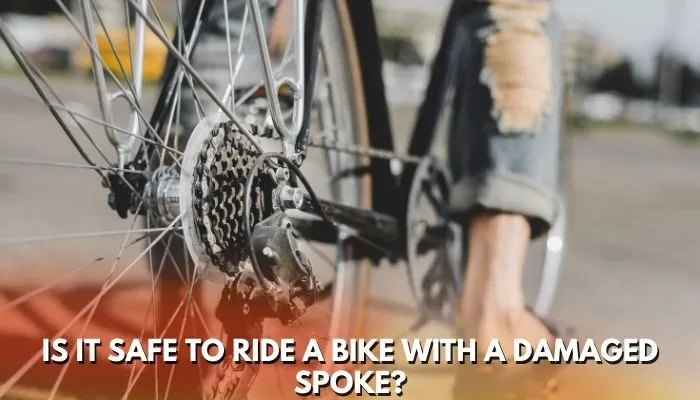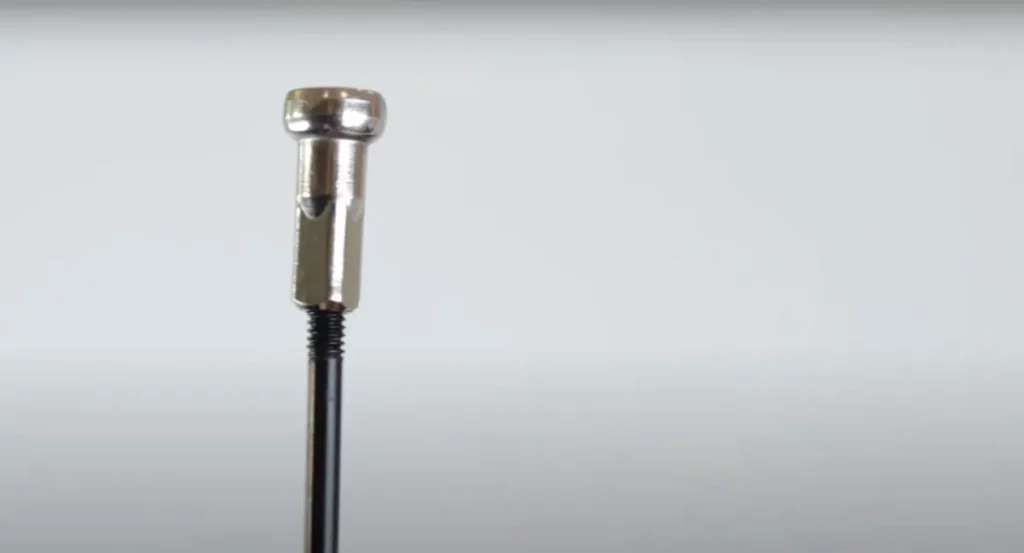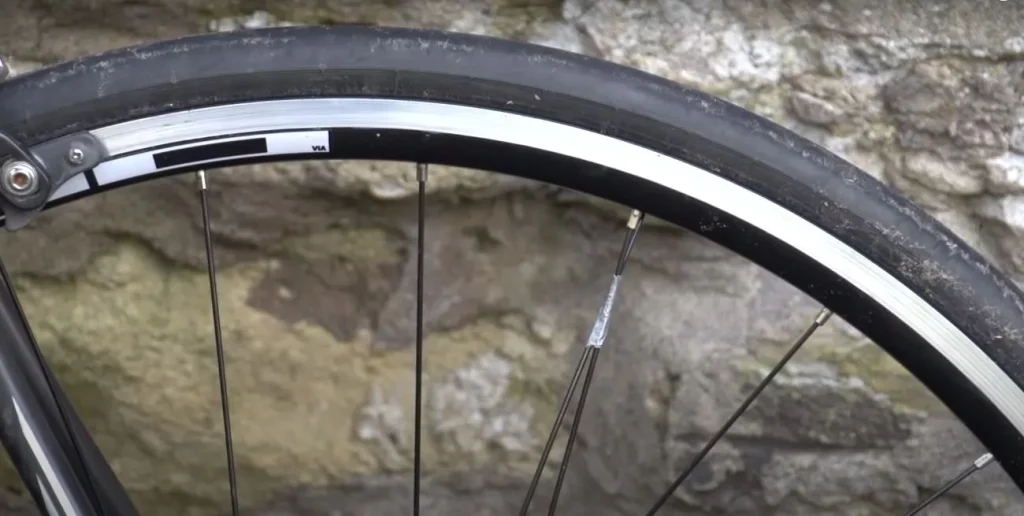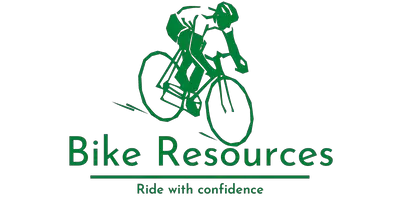Is It Safe to Ride a Bike With a Damaged Spoke?

The spokes on your bike’s wheels are identical to the foundation of a building. Even when there are no obstacles in the way, they determine the durability of a building. The majority of riders have sometimes experienced broken spokes. It can be because of holes or just ordinary wear and tear. The wheels might even start to tremble, and you could potentially hear it collapse. Yet, given it is only a property of being a biker, you shouldn’t concern too much about this.
Table of Contents
Short Answer:
Yes, you definitely can. Continuing to ride with a broken spoke will not harm you or your bike. In order to prevent damage to other components of the bike, the spoke should be taken from the nipple straight away. It’s advised not to ride the bike, however, if a few of your spokes are broken.
Therefore, do not delay in replacing the damaged spoke. The issue is not that you will have trouble riding but rather that a broken spoke may force the load distribution to become imbalanced. The wheels might become extremely unstable as a consequence of more spokes breaking.
Can You Ride A Bike With A Broken Spoke?
Typically, bike riders encounter this at most once in their careers. You find a broken spoke after noticing your wheel become wobbly. It begs the question of whether it is better to keep riding or have it mended straight away.
Even with a damaged spoke, you can still ride a motorbike. You can keep riding even if a spoke breaks unexpectedly, and there is no nearest repair shop. Secure the broken spoke with tapes and knots, or discard it to prevent further damage to the surrounding spokes or other bike elements. You might also try to repair the spoke by yourself as well.
The Essential Function Of A Spoke

The mechanical rods, known as spokes, connect the wheel’s rim to the hub. Due to the fact that they are typically out of the way, many people refuse even to notice them. Yet spokes perform several crucial jobs, including the following:
- Between both the rim and the hub, they evenly distribute the weight of the passenger and the bike.
- By uniformly drawing it inward, they tighten the rim.
- They transfer the leg power of the rider from the hubs to the wheels.
What Causes A Spoke To Break?
Bikes have rims on their wheels. The spokes that link each rim to the wheel are numerous. While the other half of the spokes pull to the right, half of the spokes drag to the left. The wheel runs “true” because of them since they retain tension on the rim. This only implies that the ride is calm and straight, without any bobbing to the left or right.
Dust and filth accumulate on the rim over time. It starts to deteriorate from the grime, and the tension starts to fluctuate. With time, there is a higher probability of a spoke breaking free. They need to be tightened or loosened to modify and maintain the tension.
When a wheel meets a barrier or other bump at an inappropriate angle, it may possibly collapse. A hit to something may result in one or more spokes coming free. The likelihood of spoke damage occurring as rim damage increases significantly. There are several other causes due to which your bike spokes may get broken or damaged.
- Broken rim
If you’ve found that your spokes are repeatedly failing, it might indicate that something more serious is going on. In order to prevent the wheel from becoming uneven, you should examine the rim for breakage or form deformation. As a result, the spokes experience increased pressure in order to preserve the right level of tension, which frequently results in their breakdown.
- Fatal crashes
They frequently spoke breaks due to accidents. Spokes can quickly become damaged or unfastened if you ride on a particularly bumpy road, hit deep potholes, or get caught on a barrier. Make sure you check your wheels after such an accident and try to drive cautiously over uneven ground.
- Damage from wear and tear
If you ride the very same bike for an extended period of time, tear and damage are inevitable. Spokes are comparatively light metallic objects. By flexing, they disperse weight. The spokes may eventually break due to the twisting and pressure between the rim and the spokes over time. Older bikes tend to have this problem more frequently.
- Hub flange with cracks
Through the hub flange, the spokes are linked to the center of the wheel. Spokes can quickly get loosened due to a damaged hub flange. The hub flange may crack as a result of weakened metal components, which might also require maintenance. To avoid this issue, frequently examine your bike.
- Tiredness
The wheel is subjected to an immense amount of pressure by a heavy rider, a motorbike packing a lot of gear, or a rider that rides haphazardly. The spokes may get looser with time, or the rim may experience damage. Although it’s possible that earlier models are more vulnerable to this, the issue could still occur if you ride your bike violently on a constant schedule.
- Defect in Manufacturing
It may be the result of poor manufacturing if you just purchased an entirely new bike and discover that some of the spokes are loose or broken. Spokes on poor-quality wheels endure a great deal of strain and tension, which contributes to their inevitable downfall.
Thankfully, a comprehensive examination of all the major contributors to a broken spoke may be accomplished through regular maintenance. The spoke tension, damaged rims, and loosened or fractured spokes are all examined by technicians. In order to prevent the spokes from cracking, it would be great if you cleaned the bike’s rim properly as well. This is due to the fact that dirt accumulation makes the wheel imbalanced. Moreover, be sure to carry out weekly wheel examinations to find any cracked or loose spokes.
The Best Way to Tell Whether a Spoke Is Broken
It’s not always clear when you have a damaged spoke. In rare circumstances, especially if something wobbly has just passed you by, you could be capable of hearing it break. Wheels that are unsteady are another indication that something is happening. Inspecting your wheels for damage on time is a wise decision.
Identifying a Broken Spoke

Talking about whether can you ride a bike with broken spokes, for the objective of preventing mishaps, you must be capable of identifying broken spokes. There are various techniques to identify a broken spoke, which include:
- By sight:
It’s tough to determine if a spoke has broken when riding your bike. But if you routinely inspect your vehicle, you’ll be likely to see any loose or damaged spokes. Your safety depends on you accomplishing this task.
- Through sound:
If your wheel is making a clunking sound, it most probably has a damaged or loose spoke.
- By sensation:
Spokes are responsible for distributing load and mass in a consistent fashion. So, your bike will feel uncomfortable when a spoke break or becomes loose. A loose and broken spoke is most probable to be responsible if you discover that your ride becomes less fluid than usual or that you’re losing your equilibrium.
How to Fix a Broken Spoke
It would be best if you were mindful of the dangers that come with biking with a broken spoke now that you are aware of the real problems treatment. In the event that a spoke breaks, you ought to go one of the subsequent paths:
Make sure you keep duct tape or a spare tire on hand at all times. In order to prevent further damage to the other bike components in the event that one or more spokes break, glue them to the surrounding spokes. If you’re already on the road and reluctant to risk continuing your trip, keep a bike repair kit and spare spokes on hand.
It is recommended that you visit a professional technician rather than attempt to fix several broken spokes yourself if you detect them. The more serious the condition, the more likely it is that you will injure yourself.
Can I Ride My Bicycle With A Broken Spoke?
Depending on how many are broken or where you are at the moment, you should decide whether or not to keep riding after spotting a broken spoke. It’s pretty secure to ride the remainder of your journey if a lone spoke breaks free while you’re on your way to your job. At the completion of your excursion, take into account the problem.
Every rider should ideally have a modest roadside repair kit with them at all times. In that case, you may replace the damaged spoke before any further damage takes place. Three or four loose or broken spokes, however, will require you to stop riding. If you don’t, the wheel may significantly buckle, needing expensive repairs.
Also, if a lot of spokes break at once and you have any wheel lights, they can fall out. Although it’s feasible to ride a bike for several weeks with only one spoke missing, the more time it continues without repair, the more damage will be done. There will be more spokes that come off. The wheel could start to break, and at a certain point, it will have to be carried to a local repair shop.
FAQs:
How to mend a broken spoke instantly?
This calamity is something you can plan for beforehand. Always keep spare spokes on hand to repair issues as they happen and to repair them completely.
Have an alternative spoke replacement kit on hand as an alternative so you can obtain a short-term fix until you come back home or to a local bike repair shop.
Whatever you have or don’t have, link the broken spoke to a sturdy one so that you won’t trip over the loose wire and hurt yourself.
How should a broken bicycle spoke be fixed?
When this occurs, you should do the following two actions:
Once the damaged spoke parts have been retrieved or wrapped around a neighboring spoke.
check to ensure that the wheel is accurate enough to slide through the frame without contacting anything. If allowed to flap around, the spoke may become trapped in the drivetrain, contributing to far more significant issues.
Should I still be able to ride my motorcycle with a spoke missing?
The wheel needs to be trued, and the substitute will have to be installed, but a single missed spoke won’t make the wheel impossible to ride.
How frequently do spokes crack?
Not often, but you must get them trued if you ride regularly. You should get your trued once every month and a half because you bike approximately 400 miles every month. Given that it takes time to break in, a new bike will probably need to be trued somewhat frequently during the initial few months.
Is it possible to change a spoke without taking the tire off?
To access the nipple, in addition to having the spoke(s) laced through the hub, you must detach the tire, tube, and rim stripping. On the back wheel, you might additionally have to detach the brake rotors and the cassette.
What sound do loose spokes make?
With each wheel revolution, your body weight presses against the spokes, making them too often move. As the spokes come into contact with one another when they cross, it might produce a clicking or ticking sound. The crossed pairs of spokes on the front wheel clearly make ticking sounds when pressed.
Conclusion:
Considering what you now know, can you ride a bike with a broken spoke? When riding a bike with a broken spoke, there should be no cause for concern. It will carry the load until you get safely to your location, whether at home or a bike repair shop. Going to a local bike shop could be a better alternative than fixing it yourself since doing so may require multiple specialized tools for a basic procedure.
